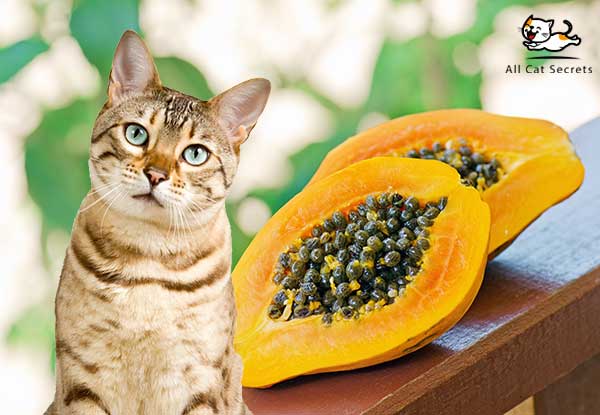Humans rely heavily on fruits like apples, bananas, and papayas to supplement their nutritional requirements.
Fruits abound in minerals and vitamins that promote normal growth and development. They’re also rich in powerful antioxidants that help to minimize the risks of disease by inhibiting the adverse effects of free radicals in body cells.
In fact, the old adage – an apple a day keeps the doctor away – was coined based on the incredible disease-prevention abilities of, not only apples, but fruits in general.
But can the same be said about cats and papayas? Can cats eat papayas?
The short answer is yes, cats can eat papaya. It’s undeniably true that cats are obligate carnivores whose diets primarily consist of lean meat. However, these animals can safely snack on fruits and veggies occasionally. Papaya is one of the many fruits considered safe for cats. The fruit doesn’t contain any toxins known to pose immediate health risks in cats. Besides, it abounds in essential nutrients that your feline friend might benefit from.
But as you may have guessed, cats can only eat papaya in moderation. Excess consumption of papaya (and fruits in general) could prove more harmful than helpful to your feline companion.
Read on for more insights into cats and papaya. The post shall unpack, among other things, the health benefits of papaya for cats and how to go about serving this fruit to your kitto.
Table of Contents
Introducing Papayas
Papaya is an orange and green fruit produced by the Carica papaya tree. The fruit is famous for its sweet taste and soft texture. It’s commonly consumed as a standalone snack but may also be incorporated into meals as part of a salad or dessert.
Besides papaya’s soft, succulent flesh, its seeds are also edible. The seeds may be bitter and unappealing to the taste. But they contain many of the nutritional elements found in papaya flesh.
The papaya tree was originally native to Central America, particularly in subtropical climates. However, the tree is now cultivated in numerous countries worldwide.
Papaya goes by numerous other names, depending on the specific region it’s cultivated. Common alternative names include pawpaw, kepaya, lapaya, tapaya, mamona, and melon zapote.
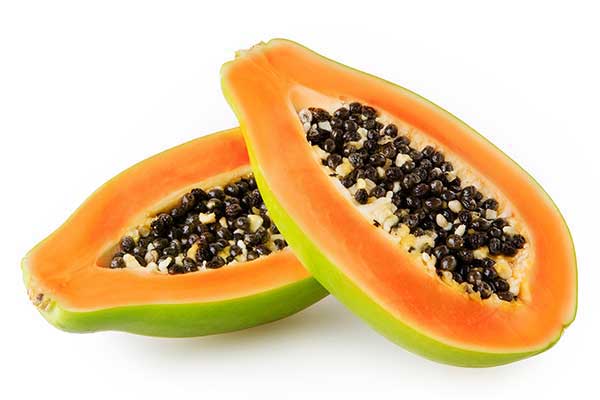
Papaya is also available in numerous varieties and cultivars. Examples include;
- Bettina
- Coorg honeydew
- Guinea gold
- Higgins
- Honey gold
- Hortus gold
- Improved Peterson
- Kapaho solo/Puna solo
- Sunnybank
- Waimanolo
- Washington
- Wilder
- High protein cat food dry formula with real chicken as the first ingredient
- Natural with prebiotic fiber nourishes specific intestinal bacteria for digestive health
- Wholesome cat food dry kibble with vitamin A and Omega-6 fatty acids to nourish skin and coat
Last update on 2024-07-16 / Affiliate links / Images from Amazon Product Advertising API
Health Benefits of Papaya for Cats
One way to answer the question ‘are papaya safe for cats’ is by delving deeper into some of the fruit’s common health and nutritional benefits.
Now, one average-sized papaya (about 152 grams) boasts the following nutritional elements;
- Calories – 59
- Carbohydrates – 15 grams
- Fiber – 3 grams
- Protein – 1 gram
The same serving of papaya contains 157% of the recommended daily intake (RDI) of vitamin C, 33% of the RDI of vitamin A, 14% of the RDI of vitamin B9, and 11% of the RDI of potassium. There are also trace amounts of other essential vitamins and minerals like vitamins (B1, B3, B5, E, and K), calcium, and magnesium. Not to mention powerful antioxidants like carotenoids.
The following are the exact ways papaya may benefit your cat;
1. Papaya May Aid Digestion
Like all fruits, papaya is rich in dietary fiber. The fruit contains both soluble and insoluble fiber. Numerous studies have established a close relationship between fiber-rich foods and improved digestion.
The soluble fiber in papaya aids digestion by nourishing your cat’s gut microbiomes. Gut microbiomes are beneficial microorganisms, including bacteria, fungi, and viruses, that live throughout an animal’s digestive tract.
A healthy balance of these microorganisms might help reduce the risks of certain digestive and metabolic disorders like inflammatory bowel disease.
On the other hand, the insoluble fiber in papaya can improve your cat’s digestion by bulking up the animal’s stool. That translates into more frequent bowel movements. Therefore, insoluble fiber may help to combat gastrointestinal issues like constipation.
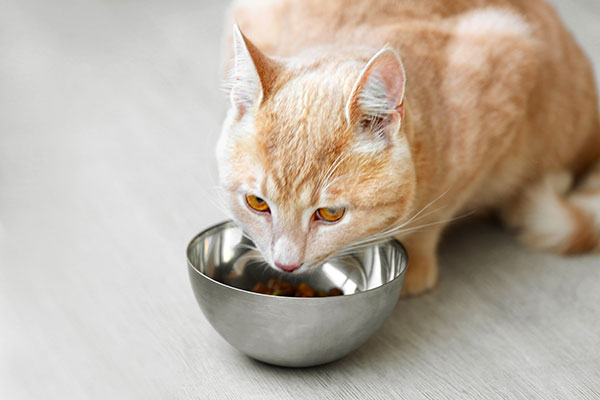
2. Papaya May Improve Protein Digestion
Fiber isn’t the only nutrient in papaya that aids digestion. The fruit also contains papain, a potent enzyme known to break down the tough protein chains found in muscle meat.
In fact, it’s due to the protein papain that papaya has been used as meat tenderizer from time immemorial.
3. Papaya May Support Weight Loss and Hydration
Not only can the high fiber content in papaya aid your cat’s digestion. It might also help to keep the animal’s weight in check.
Fiber is famous for inducing a sense of fullness fast and maintaining the same sensation much longer. So, mixing small portions of papaya into your cat’s regular food is a creative way to control the food portions your feline friend can eat in one sitting. This can ultimately help to maintain the animal’s weight.
As a weight managing nutrient, fiber often works synergistically with water. And water also happens to be fairly abundant in ripe papaya fruits.
Besides supporting weight loss, the high water content in papaya might also promote hydration.
4. Papaya May Prevent Iron Deficiency
Papaya is rich in vitamin C (ascorbic acid), which is noted for its role in boosting iron absorption.
Vitamin C also plays a role in the growth and development, as well as the repair of body tissues. The vitamin is involved in the formation of cartilage, wound healing, and the maintenance of bones and teeth.
Ascorbic acid also contains some antioxidant properties.
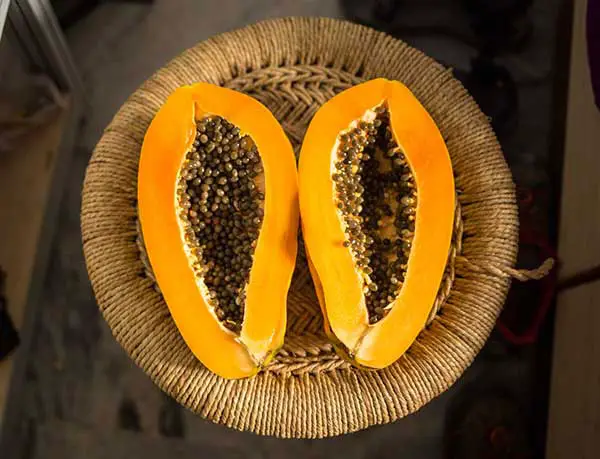
5. Papaya May Improve Your Cat’s Vision
Vitamin A deficiency is the leading cause of age-related macular degeneration and a host of other vision problems. Fortunately, papaya is rich in this vitamin.
Supplementing your cat’s diet with papaya may help to protect against age-related vision decline.
The vitamin A in papaya may also boost your cat’s immunity by guarding against certain cancers and reproductive conditions. The vitamin also supports bone development.
6. Papaya May Support Red Blood Cell Formation
Vitamin B9, also known as folate, is another important vitamin found in papaya fruits. The vitamin is most famous for its role in supporting red blood cells formation.
Vitamin B9 is especially crucial during the earlier stages of gestation as it can help to minimize the risks of congenital disabilities.
Folate is also involved in DNA synthesis. Again, that makes papaya a recommended supplement for pregnant cats.
7. Papaya May Improve Your Cat’s Heart Health
The health of your cat’s organs, particularly the heart and kidneys, relies heavily on a balance of potassium and sodium levels in the bloodstream.
Fortunately, papaya is high in potassium. This mineral helps to offset the negative effects induced by unhealthy sodium levels in the body.
But that’s not all. Potassium may also maintain your cat’s health by regulating the animal’s heartbeat. The mineral also ensures the proper function of nerves and muscles while also playing a role in protein synthesis.
- Works as a dog food topper - For pet parents looking for an alternative to capsules, raw treats, or soft chews, all it takes is a...
- A tasty & body nourishing treat for cats & dogs - Essential fatty acids for a healthy coat.
- Powerful Omega Fatty Acids - This premium fish oil liquid formula is loaded with the healthy Omega-3 fatty acid (with epa and dha)...
Last update on 2024-07-16 / Affiliate links / Images from Amazon Product Advertising API
8. Papaya May Boost Your Cat’s Immunity
Papaya is loaded with antioxidants, including carotenoids like lycopene.
Antioxidants are compounds that reduce oxidative stress by countering the adverse effects of free radicals in the body.
These compounds are particularly effective at minimizing the risks of heart disease, diabetes, and some cancers.
Is Papaya Good For Cats To Eat?
Now that we’ve reviewed several potential health benefits of papaya for cats, you might now be wondering, is it okay for cat food to contain papaya?
Papaya can be a healthy and nutritious supplement for cats if fed in moderation. So, it’s perfectly okay for cat food to contain some traces of this fruit.
Can my cat eat papaya then?
Although papaya can be a healthy treat for cats, the fact that the fruit is inherently a plant-based food means it could cause some side effects. The following section sheds more light into the possible issues with papaya for cats.
Common Side Effects of Papaya for Cats
1. Gastrointestinal Complications
Papayas are high in fiber and water. Ordinarily, that should be a great thing as these compounds can support digestion, weight loss, and hydration.
However, fiber- and water-rich fruits are infamous for their laxative effects.
Papaya might induce unintentional vomiting and diarrhea in cats. That’s especially if feeding too much of this fruit to your feline friend for the first time.
Besides, remember that cats are obligate carnivores whose diet mainly consist of animal protein. Evolution has not prepared your cat for plant-based foods like pawpaw. So, even if the fruit were low in fiber and water, the risks of stomach irritation would still be there.
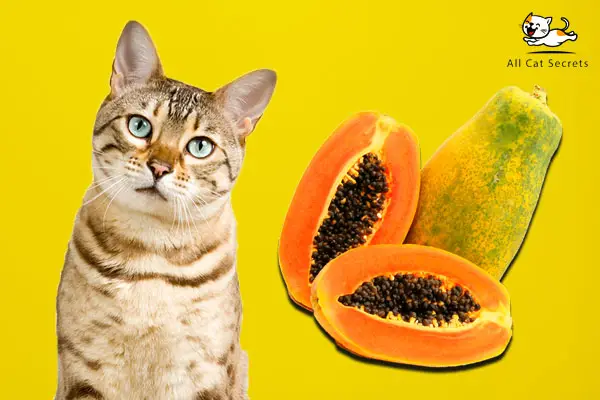
2. Kidney Issues
Papaya is rich in healthy carbohydrates. While these carbs may benefit humans, consumption of the same could prove disastrous for cats.
The high-carb content in papaya may trigger a surge in your cat’s blood sugar levels. High blood sugar is a major risk factor for renal conditions like diabetes.
So, can cats with kidney disease eat papaya?
Papaya contains several minerals known to aid organ function, such as potassium. But the fruit is also worryingly high in carbohydrates.
Unmonitored consumption of papaya could cause blood sugar spikes and increase your cat’s risks of kidney diseases. Therefore, cats with kidney disease should generally avoid papaya.
Other Common Issues With Papaya for Cats
Besides the health implications of consuming papaya, the fruit may also pose choking hazards in cats. The choking risks of papaya in cats mainly depend on three aspects – the sizes served, the part of the fruit given to cats, and how ripe the fruit is.
That underscores the importance of giving your cat bite-size papaya portions. It’s also best to go for fully ripe papaya fruit. Not only is unripe papaya a choking risk. It’s also bitter and more difficult to handle.
If you must give your cat unripe papaya, consider boiling or steaming the fruit. That will soften the flesh, making it easier for your cat to chew.
When it comes to the part of the papaya to feed your cat, your best bet is to consider the fresh.
- Cat Probiotics: 1st Ever Made USDA Certified Organic Liquid Probiotics for Cats/Felines. 30-90 Day Supply 4oz Glass Bottle. 100%...
- Proprietary Strains for Cats: Isolated strains known to be useful uniquely to our feline friends. Our Cat Probiotics include a...
- Multiple Benefits
Last update on 2024-07-15 / Affiliate links / Images from Amazon Product Advertising API
Can cats eat papaya seeds?
Papaya seeds may abound in nutrients and antioxidants. But the seeds could easily choke your cat. So, avoid giving your cat papaya seeds.
Can cats eat papaya skin?
Papaya skin is not only bitter. It’s also reasonably tough and may be difficult for your cat to digest. Therefore, papaya skin is unsafe for your kitto.
Can cats eat papaya leaves?
The rules of papaya skin for cats also apply to papaya leaves. So, it goes that cats shouldn’t consume papaya leaves either.
Can cats have papaya juice?
Cats can eat papaya juice but in very tiny amounts. Drinking too much papaya juice might trigger diarrhea and vomiting. Plus, the juice is adversely high in sugars.
Can cats eat dried papaya then?
If you’re averse to the idea of giving your cat papaya juice, you might opt for dried papaya. However, this will mean that your feline friend doesn’t enjoy the high water content in this fruit. Besides, dried papaya may contain salt as a preservative, and cats shouldn’t eat salty foods.
Can cats have papaya chips?
Papaya chips is okay for cats provided that you feed it in moderation and the chips don’t contain any ingredients known to be toxic to cats.
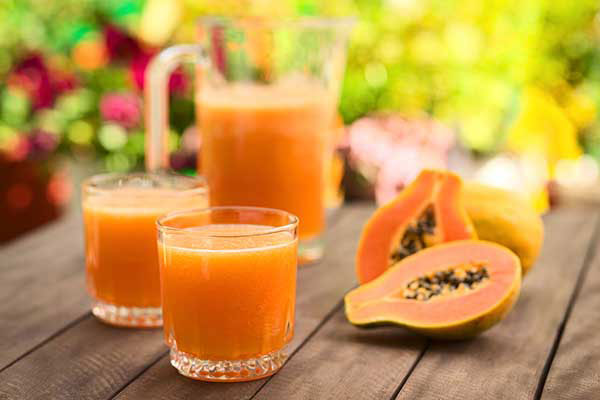
Can Kittens Eat Papaya?
A kitten’s stomach tends to be more sensitive than that of mature cats.
So, while kittens may also benefit from papaya’s high nutritional value, you should probably avoid serving this fruit to them.
How Do I Serve Papaya To My Cat?
Some of the frequently asked questions relating to cats and papayas are – ‘is papaya ok for cats’ and ‘how much papaya can I give my cat?’
We’ve repeatedly reiterated that papaya is healthy for cats only if served in moderation.
But that begs another question, can cats eat papaya every day?
If you’ve always wondered to yourself, ‘can cats eat papaya daily,’ the answer is a resounding no. Cats should only have papaya as an occasional treat. And whenever you serve the fruit to your kitto, be very mindful of the portions.
Besides serving small amounts of papaya to your cat occasionally, it’s also important to understand whether your cat can eat raw or cooked papaya.
The good news is that both raw and cooked papaya are okay for cats.
However, it’s best to opt for the raw version of the fruit. All you need is to ensure you identify fully-ripe but fresh papaya fruits. Rinse the fruit thoroughly in water, then peel the skin and remove its seeds. Finally, cut the fruit into small sizes and mix the slices into your cat’s regular food.
Can cats eat cooked papaya?
Cats will enjoy cooked papaya the same way they enjoy the fruit in its raw form. However, the only time cooked papaya is recommended for cats is if the flesh isn’t ripe enough.
The best cooking methods would be boiling and steaming over moderate heat. Avoid adding salt or spices like garlic and onions, as cats are generally allergic to these.
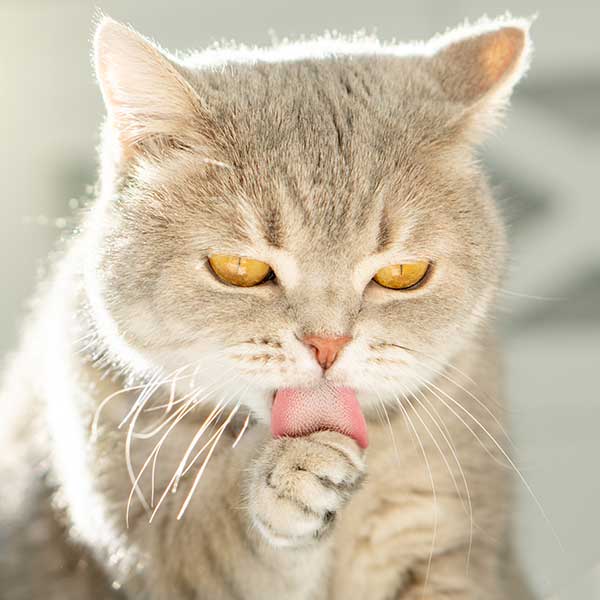
Conclusion: So, Is Papaya Healthy For Cats?
Papaya is not only healthy for cats. The fruit is also safe for your feline friend as it contains no toxins known to harm cats.
However, the safety of papaya for cats depends on how the fruit is served. As with any fruit, it’s best to give papaya to your cat only as an occasional treat.
It’s also recommended to prepare papaya well before serving it to your kitto. That includes peeling off the skin and removing all the seeds, then slicing the flesh into bite-size portions.
Checkout Our Favorite Cat Products
1. Best Online Course For Cat Parents
Our favorite: The Cat Language Bible (How to Finally Understand And Speak to Your Cat) – A new form of cat to human communication that many cat owners have dreamed about… but few have actually thought possible.
2. Best Immune Support For Cats
Our favorite: Tomlyn Immune Support – Best Supplement for Cats and Kittens.
3. Best Cat Treats
Our favorites: LIFE ESSENTIALS All Natural Freeze Dried Chicken And Sheba Meaty Tender Sticks – Both are Great.

